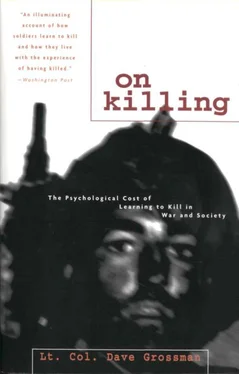Marshall understood the mechanics and emotions of combat. He was a combat veteran of World War I, asking the combat veterans of World War II about their responses to battle, and he understood, he had been there. “I well recall…,” said Marshall, “the great sense of relief that came to [World War I] troops when they were passed to a quiet sector.” And he believed that this “was due not so much to the realization that things were safer there as to the blessed knowledge that for a time they were not under the compulsion to take life .’” In his experience that philosophy of the World War I soldier was “Let ’em go; we’ll get ’em some other time.”
Dyer also studied the matter carefully, building his knowledge on those who knew, and he too understood that “men will kill under compulsion — men will do almost anything if they know it is expected of them and they are under strong social pressure to comply — but the vast majority of men are not born killers.”
The U.S. Army Air Corps (now the U.S. Air Force) ran head-on into this problem when it discovered that during World War II less than 1 percent of their fighter pilots accounted for 30 to 40 percent of all enemy aircraft destroyed in the air, and according to Gabriel, most fighter pilots “never shot anyone down or even tried to.” Some suggest that simple fear was the force that prevented these men from killing, but these pilots usually flew in small groups led by proven killers who took the nonkillers into dangerous situations, and these men bravely followed. But when it came time to kill, they looked into the cockpit at another man, a pilot, a flier, one of the “brotherhood of the air,” a man frighteningly like themselves; and when faced with such a man it is possible that the vast majority simply could not kill him. The pilots of both fighter and bomber aircraft faced the terrible dilemma of air combat against others of their own kind, and this was a significant factor in making their task difficult. (The matter of the mechanics of killing in air battles and the U.S. Air Force’s remarkable discoveries in attempting to preselect “killers” for pilot training are addressed later in this study.)
That the average man will not kill even at the risk of all he holds dear has been largely ignored by those who attempt to understand the psychological and sociological pressures of the battlefield. Looking another human being in the eye, making an independent decision to kill him, and watching as he dies due to your action combine to form the single most basic, important, primal, and potentially traumatic occurrence of war. If we understand this, then we understand the magnitude of the horror of killing in combat.
The Israeli military psychologist Ben Shalit in his book The Psychology of Conflict and Combat, referring to Marshall’s studies, says that it is “clear that many soldiers do not shoot directly at the enemy. Many reasons are given; one of them — which, oddly enough, is not often discussed — may be the reluctance of the individual to act in a direct aggressive way.”
Why is this not often discussed? If Johnny can’t kill, if the average soldier will not kill unless coerced and conditioned and provided with mechanical and mental leverage, then why has it not been understood before?
British field marshal Evelyn Wood has said that in war only cowards need lie. I believe that to call the men who did not fire in combat cowards is grossly inaccurate, but those who did not fire do, indeed, have something to hide. Or at the very least something that they would not be very proud of and would readily lie about in later years. The point is that (1) an intense, traumatic, guilt-laden situation will inevitably result in a web of forgetfulness, deception, and lies; (2) such situations that continue for thousands of years become institutions based on a tangled web of individual and cultural forgetfulness, deception, and lies tightly woven over thousands of years; and (3) for the most part there have been two such institutions about which the male ego has always justified selective memory, self-deception, and lying. These two institutions are sex and combat. After all, “All is fair in love and war.”
* * *
For thousands of years we did not understand human sexuality. We understood the big things about sex. We knew that it made babies, and it worked. But we had no idea how human sexuality affected the individual. Until the studies of human sexuality by Sigrnund Freud and researchers of this century we had not even begun to really understand the role that sex played in our lives. For thousands of years we did not truly study sex and therefore had no hope of ever understanding it. The very fact that in studying sex we were studying ourselves made impartial observation difficult. Sex was especially difficult to study because so much of the ego and self-esteem of each individual was invested in this area full of myths and misunderstanding.
If someone was impotent or frigid, would he or she let that be common knowledge? If the majority of the marriages of two centuries ago suffered problems with impotence or frigidity, would we have known? An educated man of two hundred years ago would have probably said, “They manage to make plenty of babies, don’t they? They must be doing something right!”
And if one hundred years ago a researcher discovered that sexual abuse of children was rampant in society, how would such a discovery be treated? Freud made just such a discovery, and he was personally disgraced and professionally scorned by his peers and by society at large for even suggesting such a thing. It is only today, one hundred years later, that we have begun to accept and address the magnitude of sexual abuse of children in our society.
Until someone with authority and credibility asked individuals in privacy and with dignity, we had no hope of ever realizing what was occurring sexually in our culture. And even under such circumstances, society as a whole has to be sufficiently prepared and enlightened in order to throw off the blinders that limit its ability to perceive itself.
* * *
In the same way that we did not understand what was occurring in the bedroom, we have not understood what was occurring on the battlefield. Our ignorance of the destructive act matched that of the procreative act. If a soldier would not kill in combat, when it was his duty and responsibility to do so, would he let that be common knowledge? And if the majority of soldiers two hundred years ago did not fulfill their duties on the battlefield, would we have known? A general of the era would probably have said, “They manage to kill plenty of people don’t they? They won the war for us didn’t they? They must be doing something right!” Until S. L. A. Marshall asked the individuals involved, immediately after the fact, we had no hope of understanding what was occurring on the battlefield.
Philosophers and psychologists have long been aware of man’s basic inability to perceive that which is closest to him. Sir Norman Angell tells us that “it is quite in keeping with man’s curious intellectual history, that the simplest and most important questions are those he asks least often.” And the philosopher-soldier Glenn Gray speaks from personal experience in World War II when he observes that “few of us can hold on to our real selves long enough to discover the real truths about ourselves and this whirling earth to which we cling. This is especially true,” observes Gray, “of men in war. The great god Mars tries to blind us when we enter his realm, and when we leave he gives us a generous cup of the waters of Lethe to drink.”
If a professional soldier were to see through the fog of his own self-deception, and if he were to face the cold reality that he can’t do what he has dedicated his life to, or that many of his soldiers would rather die than do their duty, it would make his life a lie. Such a man would be apt to deny his weakness with all the energy he could muster. No, the soldiers are not apt to write of their failures or the failures of their men; with few exceptions, it is only the heroes and the glory that make their way into print.
Читать дальше







